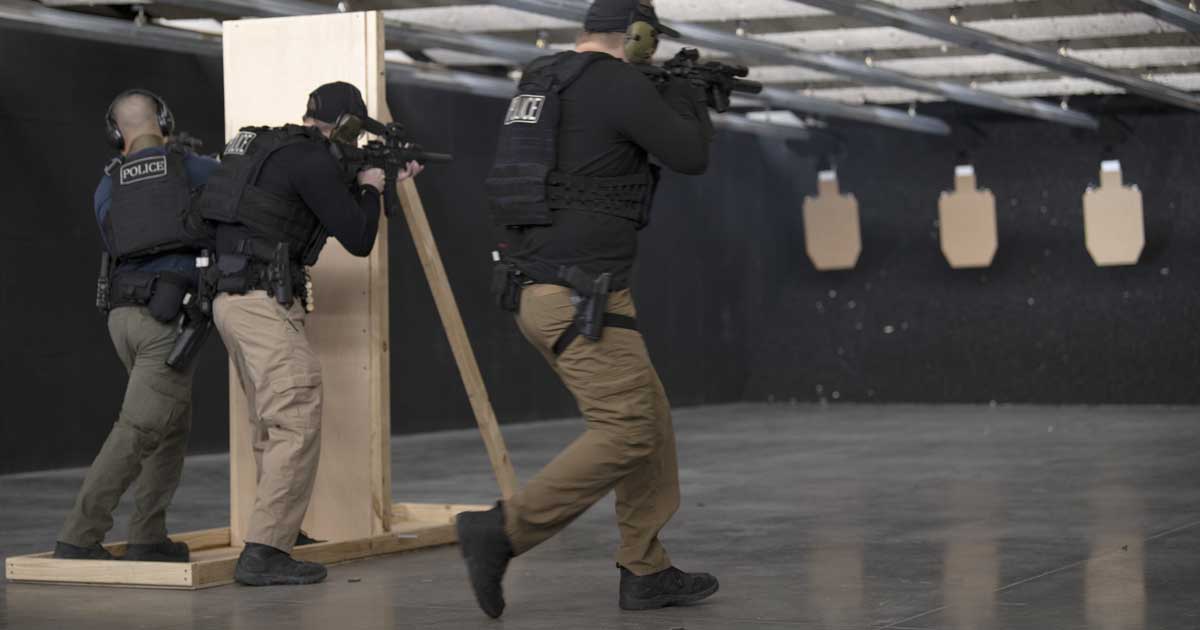Category: Public Safety14.10.2025

Firearms proficiency is a crucial component of law enforcement and public safety training. Not only does effective firearms training help officers keep themselves and the public safe, but it also sharpens already developed skills while helping officers avoid bad habits.
However, there is a lot more that goes into effective firearms training than just the lessons themselves. By encouraging repetition during the processes, it can help to support the principles of muscle memory, making it easier to respond in high-stress situations and improving performance.
Muscle memory means establishing neurological blueprints for specific motor movements by repeating a series of steps or exercises on a regular basis. Because of how powerful the brain is, taking this step can create a subconscious awareness of different situations, allowing the body to automatically react in the way it was trained.
This type of principle is applied in a lot of different settings. For example, an athlete like Steph Curry has one of the most accurate basketball shots in the NBA. This has been achieved through continuous repetition of various shooting drills from when he was young throughout his adulthood.
These repetitive actions have created more automatic motor controls. While these are still controlled consciously, the body is able to adjust or react involuntarily to support these actions because of the repetition.
There is a similar science that takes place in firearms training. The more you practice different shooting techniques, the stronger the neural pathways in your brain become. This makes it much easier long-term to remember proper hand positioning, stance, and tactical reactions.
Essentially, the more you train with firearms, the easier and more fluid the process becomes. This reduces the need for increased conscious decision-making and creates more of a systematic response, which is definitely needed in high-stress situations.
Unfortunately, many individuals practice certain activities using the wrong technique. If your fundamentals aren’t taught properly, this means you’ll start to develop muscle memory in the wrong areas. This can actually make it much harder to fix the issue over the long term since you’re trying to train the brain to deviate from a pattern it’s already been trained to follow.
Inconsistent practice can also undermine any progress you’ve made with your muscle memory. While you may be able to retain a certain amount of basic information that lasts a long time, your neural pathways will weaken over time if they aren’t constantly used and challenged. This can lead to a much longer time frame needed to retrain lost skills and information.
How you schedule your practice sessions can make a big difference to how fine-tuned your muscle memory becomes. Having regularly scheduled training sessions over a longer period is considered a more effective strategy compared to shorter, more intensive training sessions. For effective firearms training, it’s best to establish and maintain weekly or monthly range routines.
An important element of better firearms proficiency isn’t just practice, it’s actively tracking and improving on specific areas. For example, knowing your accuracy, draw speed, and the tightness of your grouping can help you identify where you excel and where you need to adjust your training. Tracking how well each of these areas improves over time will help you identify whether your training is effective enough.
Controlled training environments are much more effective than personal practice sessions. This type of training adds more structure and a distraction-free space to refine capabilities. Working closely with qualified instructors also helps to identify more nuanced tips and strategies that can help improve skills. This can be invaluable when being put in more intense training scenarios that more closely resemble what a real-life situation may be like.
Scenario-based learning can help you become more adaptable while improving your decision-making skills when you need to rely on them the most. Instead of just doing the same static firearms exercises, it’s important to add variety to your training routine. This helps you to apply the same techniques and strategies you’ve learned, but in more dynamic and uncontrolled settings.
A big part of muscle memory development isn’t just to improve firearms proficiency, but also to increase safety. By incorporating safety drills into your training and regularly practicing them, you make them second nature. This includes everything from maintaining proper trigger discipline to knowing how to properly reload, store, disassemble, and clean the firearm.
Needing to rely on your firearms training when under pressure is critical to keeping yourself and the public safe. Repetitive training in various scenarios helps engrain important best practices into your brain, allowing you to make faster and more decisive decisions in stressful environments.
Repetitive firearms drills are essential for helping you identify specific weaknesses in your technique. Instead of allowing these weaknesses to negatively impact your muscle memory, regular drills help you to quickly course-correct and apply safer and more effective strategies in the field. For example, using a simulated dry fire training system can provide more opportunities to practice drills off-site while offering active feedback on how to improve your form.
The more you practice, the better your mental resilience can become. This helps you to maintain a more adaptive mindset when confronted with important decisions in the field and also helps you to train outside your comfort zone. This is important to help you improve your capabilities and overcome different challenges you’re likely to face outside the range.
There is a wide range of law enforcement scenarios where having better firearms proficiency is essential. With the help of muscle memory, you can turn your firearms training from simple, repetitive actions into deeply ingrained, automatic motor responses. This makes it easier to retain what you’ve learned for longer periods of time, while also helping you to increase your safety, confidence, and effectiveness when you need it the most.
Fill in the form below and we'll send a link for you to download the White Paper to your inbox.